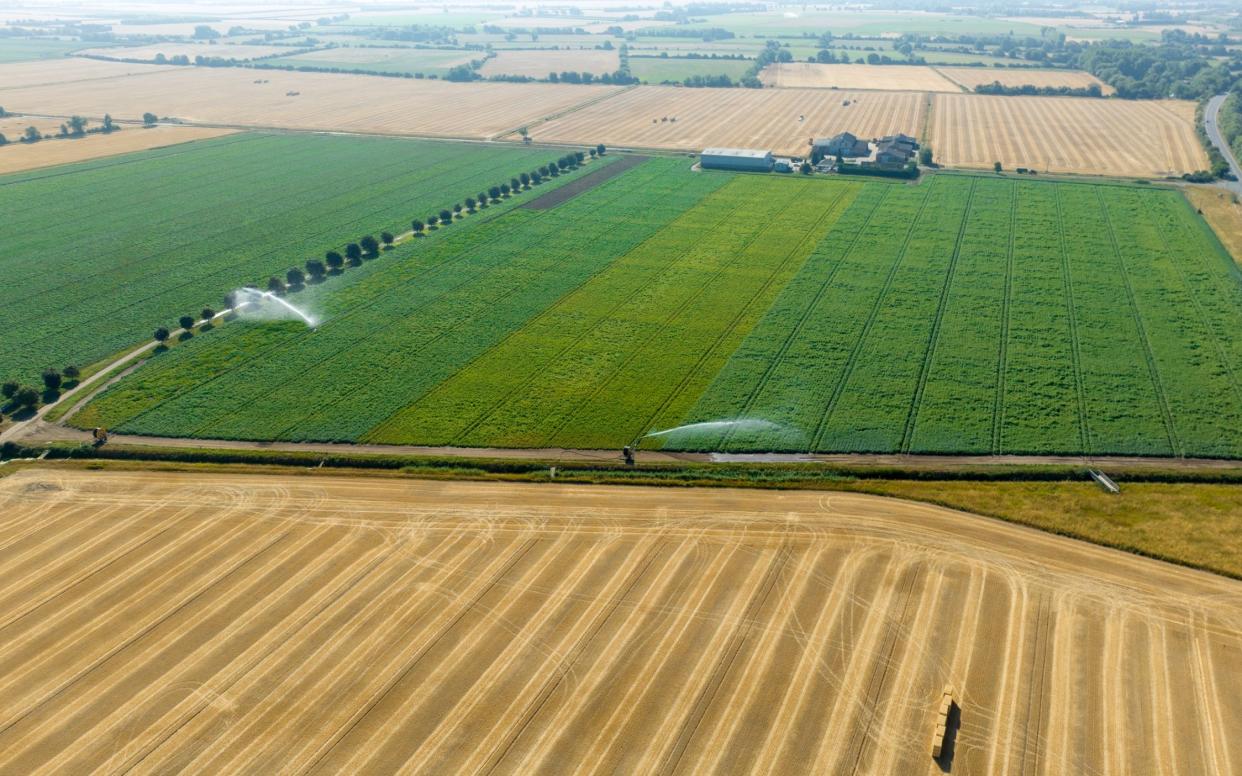UK weather: Farmers warn of crop failure in biggest English drought in 20 years

The biggest drought in 20 years has been declared across the majority of England, as farmers said half their crops could fail, households were warned of taps running dry and supermarkets faced water shortages.
An official drought has been declared in eight of 14 areas across England, encompassing most of the central and southern parts of the country.
Yorkshire Water has announced its first hosepipe ban in 27 years, joining four other companies who are bringing in restrictions.
Jamie Hannaford, a hydrologist at the UK Centre for Ecology & Hydrology, said it was the most widespread drought since at least 2003.
“This drought is notable for how large an area it’s been affecting through the summer of 2022,” he said. “It’s more widespread than the 2018-19 and 2010-12 events and overall drought conditions are more extensive than 2004-6.”

The decision to announce an official drought was made at a meeting of the National Drought Group, attended by officials, farmers, water company representatives and Steve Double, the water minister.
The meeting was told of the impact of the drought on farming, including warnings that half of the potato, carrot, apple and hop yields could be lost. Drought-tolerant maize plants are failing and milk production is down, the Government was told.
Drought status is expected to be extended to Yorkshire and West Midlands by the end of August, after the driest July since records began in 1935.
Thames Water, which is expected to announce a hosepipe ban within days, warned some of its customers in London of low pressure, and handed out bottled water in Surrey where taps ran dry. A supermarket in London has rationed bottled water, and another ran out, amid fears of stockpiling.
“All water companies have reassured us that essential supplies are still safe, and we have made it clear it is their duty to maintain those supplies,” Mr Double said.
Fires tore through grasslands in Derbyshire, London and the New Forest. The risk of a severe blaze rises to the highest level this weekend for much of England with temperatures expected to rise as high as 37C.
Morrisons became the latest retailer to end the sale of disposable barbecues over fears they could spark fires, following Sainsbury’s and Marks and Spencer.

Scientists have warned that the drought could continue into next year without sustained rain to replenish groundwaters and rivers.
A yellow weather warning is in place for thunderstorms on Monday, which could cause flash floods as rain hits ground hardened by weeks of dry weather.
Water companies have faced criticism over their handling of water supplies during the drought, and have been forced to defend their record on fixing leaks despite losing more than three billion litres a day.
Farmers accuse Government of blocking water supplies
Farmers have accused the Government of blocking the supply of water needed for crops as they warned drought could cause harvests to be halved.
The Environment Agency (EA) is denying applications from farmers to abstract water under a system that allows them to trade licences, Tom Bradshaw, deputy president of the National Farmers Union, claimed.
Mr Bradshaw said the EA was putting the environment above food security and called on George Eustice, the Environment Secretary, to intervene.
“The EA’s statutory targets are to protect the environment and they don’t in any way have to think about the impact on food production,” Mr Bradshaw said. “We know environmental protection is incredibly important, but so is producing food that everyone relies on.”
He warned that food supply could be impacted because imports may also be reduced, with much of the rest of Europe also facing what is believed to be the worst drought in 500 years, coupled with record high energy and fertiliser costs.

Richard Walker, managing director of supermarket Iceland, said there were concerns the impact on food supplies could contribute to the cost-of-living crisis.
“It won’t help, alongside no Ukrainian harvest and general inflation throughout the supply chain,” he said.
Without significant rainfall over the autumn and winter, farmers may simply choose not to plant crops next spring, Mr Bradshaw said.
“Farmers will choose not to grow crops that require irrigation. If they haven’t got that water available and contracts to give them a profitable return, in all likelihood they are not going to take the gamble,” he said.
The Tory chairman of the Commons Environment, Food and Rural Affairs Committee suggested the UK should focus on food production over “things like rewilding”.
Sir Robert Goodwill, a former minister who is also a farmer, told BBC Radio 4’s World at One programme: “Part of the Government’s plan for agriculture outside the European Union is helping farmers become more productive.
“I think we’d have to concentrate a little bit more maybe on food production, and less on things like rewilding and some of the environmental schemes, which albeit … important, we do need to make sure we can feed ourselves and feed the world.
“So, I think things like grant aid for farmers putting in reservoirs themselves, so they can pump in winter when there is water, so [they can] then use that for irrigation during the summer.”

The environment ministry is expected to lay out further measures to support agriculture in the coming days.
A Defra spokesperson said: “The UK has a high degree of food security built on supply from diverse sources, strong domestic production, as well as imports through stable trade routes.
“However, we recognise our farmers and growers are facing exceptionally dry conditions and through our agriculture monitoring groups we are working closely with the sector to assess the impacts over the coming weeks.
“We are carefully considering what further steps can be taken to support the agriculture sector and will respond accordingly.”


